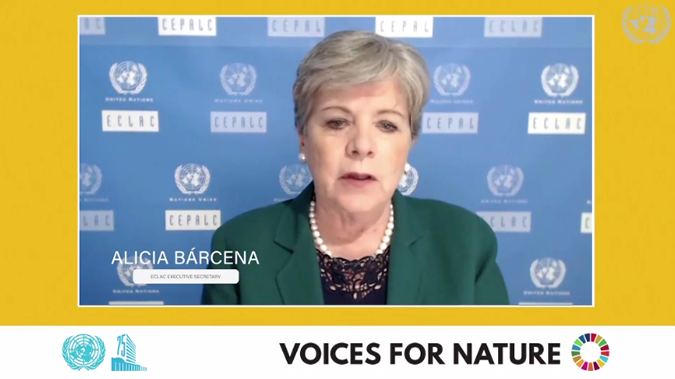ECLAC Proposes Strengthening Research, Developing National Plans and Providing Economic Incentives to Protect Biodiversity in the Region
Topic(s)
Alicia Bárcena, the regional organization’s Executive Secretary, participated via video message in the first Summit on Biodiversity convened by the UN.

“Latin America and the Caribbean is at a crossroads. Biodiversity loss and degradation needs to be addressed at local, national, regional and global levels and across all sectors and actors. We all must be part of the solution,” Alicia Bárcena, Executive Secretary of the Economic Commission for Latin America and the Caribbean (ECLAC), said in a video message transmitted during a segment of the Summit on Biodiversity, held by the United Nations in New York on September 30, 2020.
“First, we have to invest in research to strengthen information about our biodiversity. Secondly, governments must develop national plans to protect biodiversity. And thirdly, we need economic incentives to motivate a shift towards the protection of biodiversity,” Bárcena stated.
The Summit on Biodiversity, held for the first time, was convened by the President of the 75th session of the UN General Assembly under the theme of “Urgent action on biodiversity for sustainable development.” ECLAC’s Executive Secretary participated in the segment entitled “Voices for Nature” in support of the Summit, along with opinion leaders and representatives of diverse institutions.
Latin America and the Caribbean has the most extraordinary biodiversity in the world, the senior UN official indicated. “It has more terrestrial and maritime ecoregions than any other geographical region, and 31% of worldwide cultivated areas are sown with crops that originated in this region. However, since the year 2000, Latin America and the Caribbean is also the region that has lost the most forest surface area – 83 million hectares – and that has shown the largest reduction in vertebral species (94%),” she explained.
In Latin America and the Caribbean, nearly 64 million jobs depend on biodiversity, accounting for 19% of the region’s total employment. Hence, biodiversity is essential to both fighting poverty and ensuring a safer planet, she emphasized.
Healthy biodiversity provides innumerable benefits: food, employment, fuel, clean air and water, and diluted transmission of zoonotic illnesses, such as COVID-19, while also contributing to mental health, ECLAC’s highest authority underscored in her message.
It is fundamental, Bárcena said, that we reorient policy instruments to incentivize good practices and address negative externalities, taking into account as well that biodiversity is under increasing pressure from global warming.
Latin America and the Caribbean has positive examples in terms of institutional frameworks, biodiversity mainstreaming and innovative governance on this issue, the Executive Secretary stated. “ECLAC is documenting the region’s best practices in order to contribute to the post-2020 Global Biodiversity Framework. The international community, regional actors, national governments and all stakeholders must work together to promote structural change in the region. We need to take urgent action on biodiversity for sustainable development to be a reality. ECLAC stands for nature. Together we can achieve the protection of the ecological integrity of our planet,” she concluded.
Type
Country(ies)
- Latin America and the Caribbean
Contact
Public Information Unit
- prensa@cepal.org
- (56 2) 2210 2040